GMOs: Grossly Misunderstood Organisms
The Express Tribune speaks to agri scientists to understand the pros and cons of genetically-modified crops
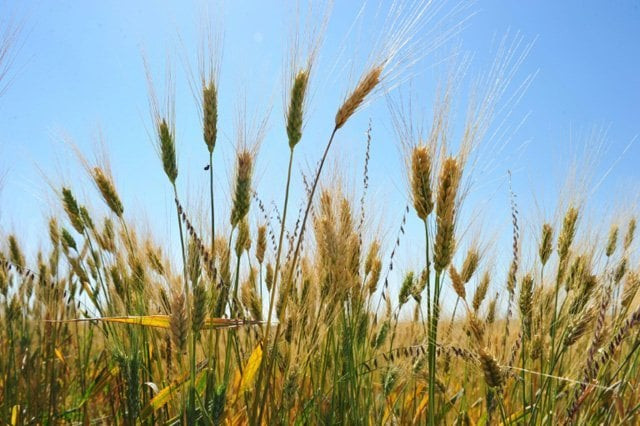
PHOTO: AFP
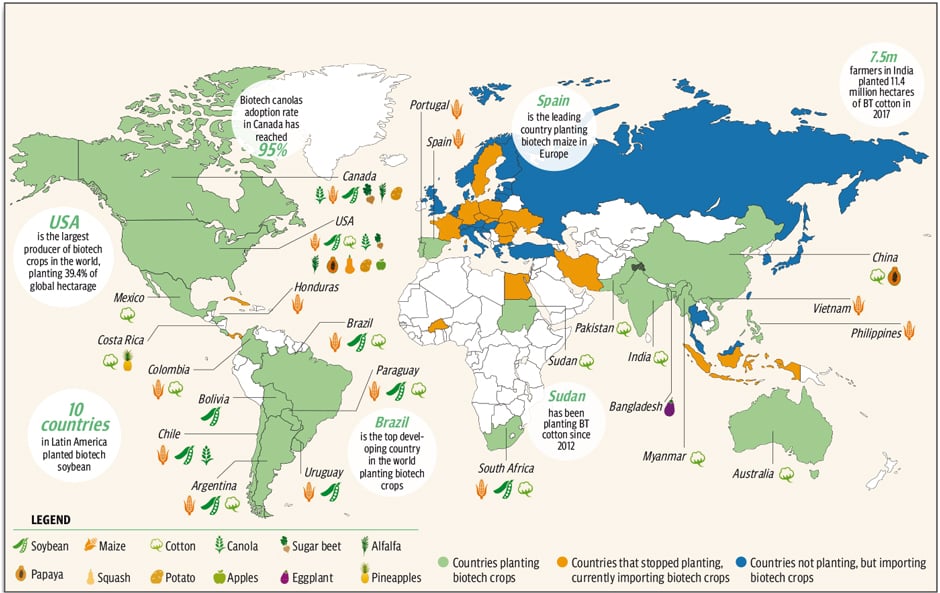
Ask why eat organic? And proponents would say the reasons are pretty straightforward: they are more nutritious, antibiotics-free, and with little residual levels of toxic pesticides. In the push for organic one of the most talked about buzzwords is GMOs. But why are we so scared of them?
GMO remains a hotly debated subject, even decades after the genetic engineering (GE) technology was first introduced. Concerns about the safety of GE products, especially GE food, are widespread. But GMO advocates claim these concerns are largely based on pseudoscience or unsubstantiated information available online.
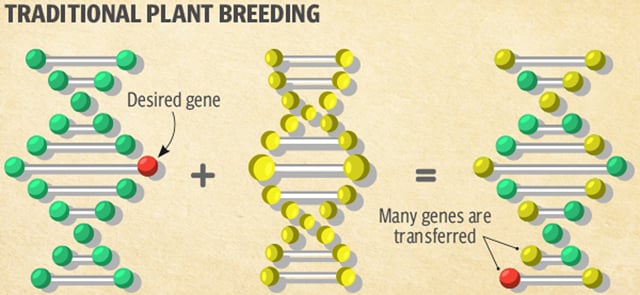
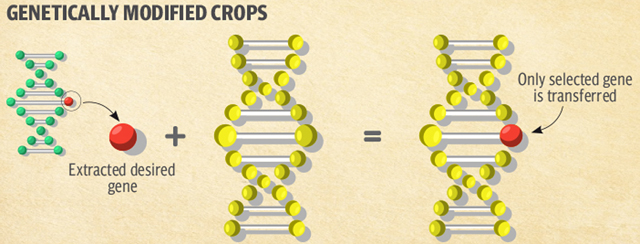
Surprisingly, these concerns are more expressed in countries where the GE technology has been in use for years. A recent survey by geneticliteracyproject.org finds 43% of Americans with high incomes and 26% of lower earners avoid purchasing GE food. This is notwithstanding the fact that a 2016 study by America’s National Academy of Sciences concluded that GE crops are just as safe to eat as their non-GE counterparts.
What is GMO and is it safe?
Dr Kauser Abdulla Malik, Professor and Dean of Postgraduate Studies FC College University Lahore, explains that GMOs, or Genetically Modified Organisms are living organisms such as plants, animals or microorganisms which have been subjected to genetic modification using molecular biology techniques, generally referred to as genetic engineering, in order to favour the expression of desired physiological traits or the production of desired biological products. Any food derived from genetically modified crops or animals is GM food.
The global area of biotech [read: GE] crops has increased 113 folds from 1.7 million hectares in 1996 to 191.7 million hectares in 2018. All major biotech crops, namely maize, soya bean, canola, cotton, and others, namely alfalfa, sugar beet, squash, eggplant, papaya, apples, and sugarcane, are cultivated in 26 countries. In 44 countries, the GM seed are imported for consumption.
There is near unanimity among scientists that GE crops are safe to consume.
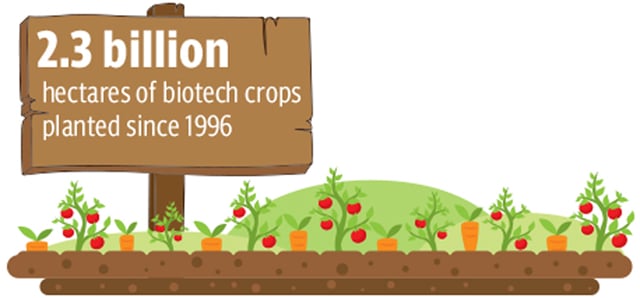
“As reported by the European Commission, the main conclusion to be drawn from the efforts of more than 130 research projects, covering more than 25 years of research and involving more than 500 independent research groups, is that GMOs are not more risky than conventionally developed products,” says Dr Donald J MacKenzie, Executive Director, Institute for International Crop Improvement Donald Danforth Plant Science Center.
A large population has been consuming GE food for more than 23 years with zero incidents reported on its safety, adds Muhammad Asim, Lead Biotechnology and Seeds, CropLife Pakistan Association
‘Frankenfoods’
Notwithstanding the scientific testimonies, anti-GMOs groups in Europe call it ‘Frankenfood’ — a phrase they have coined to emphasise perceived health hazards of GE food. Their fears stem from the perception that biotech food might be carcinogenic — that it might cause gene mutation in human beings.
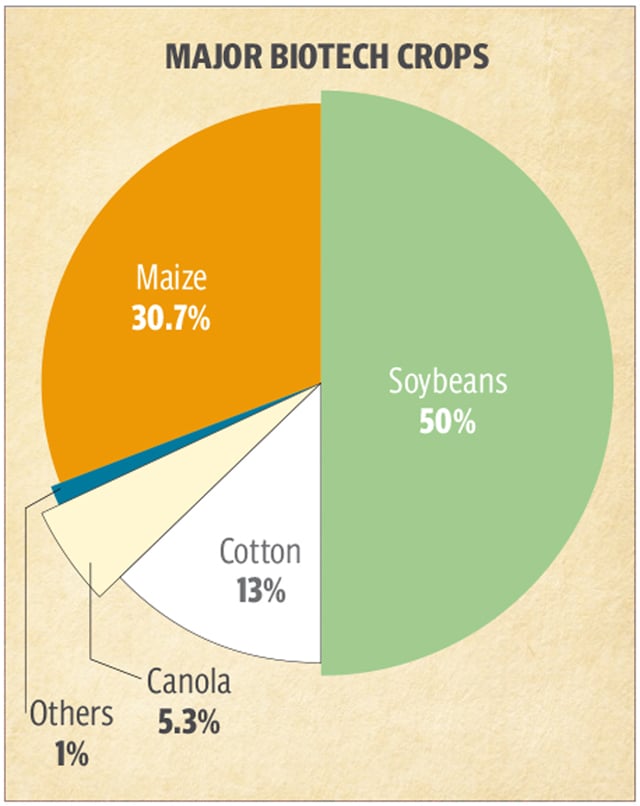
But Dr MacKenzie says people’s natural worries and apprehensions about genetic modification technology have been amplified and exploited by special interest groups for their own ends. “Certainly, there is nothing from the last nearly three decades of experience and research on GE food that would give any credence to these assertions.”
Of the 28 member states of the European Union, 19 have voted to either partially or fully ban GMOs. This came after the European Commission called for each EU nation to vote if they wanted to opt out of having to grow GMO crops even if they were allowed to do so within the boundaries of the EU. So far, the only GM crop grown in the EU — mainly within Spain and Portugal — is maize. Despite this, there are almost 60 GM crops approved for use which are freely bought and sold across the EU.
The European take on GE crops is paradoxical. “The situation on ground is in stark contrast to what is perceived as Europe’s position. The EU currently is the second largest importer of GE grain for food, feed, and processing,” says Asim.
Dr Malik blames political interests for the negative portrayal of GE foods. “In Europe, especially in Germany, it is a political agenda of the Green Party. They spend billions [of euros] on carrying out anti-GM campaigns. Even the German scientific community vigorously opposes them,” he says.
Nonetheless, not all agri scientists are convinced about the safety of GE crops. “The great majority, 98% to be precise, of dietary DNA is degraded by digestive enzymes relatively quickly but use of viruses as vectors, must increase the risk factor significantly as these are organisms which are adapted to integrating into host genomes and some represent risk factors for cancer induction,” says Dr Muhammad Khursheed, Joint Secretary at Pakistan’s Ministry of Food Security and Research.

Dr Ishfaq, a professor at the Institute of Agricultural Sciences, University of Punjab, shares the fears that GE foods might be carcinogenic. “In Pakistan, mainly women are involved in cotton picking in the fields — and we have seen a spike in cases of skin diseases among them,” he says. “These skin diseases could lead to skin cancer. This shows that even Bt cotton is not safe,” he says. Bt cotton is the only transgenic crop currently grown in Pakistan.
But Asim emphatically dismisses this claim. “It is not humanly possible for cotton pickers to get exposed to the Bt protein, unless ingested purposefully. Even then, it is an established fact that Bt protein is not harmful or allergic for human health. Over a thousand scientific studies prove that fact,” he says.
Threat to biodiversity
Another widespread concern is about the possible ill effects of GE crops on native germplasm and biodiversity. If genetically modified animals, plants and organisms are introduced into the environment, then they could affect biodiversity – existing species can be overrun by more dominant new species.
“It [GE crop] will affect the existing germplasm of Pakistan and may lead to disturbing the natural immune system of plants and animals against pests,” says Dr Khursheed. “A time might come when the pests and herbs will become resistant to these GE seeds and then we won’t have anything to control the apocalyptic situation,” adds Dr Ishfaq.
Asim says resistance is a natural phenomenon and by adopting trait quality assurance and stewardship practices insect and weed resistance can be managed. However, he dismisses the fears that GE crops would threaten native germplasm.
“In fact, GE traits present a great opportunity for domestic companies and plant breeders to collaborate and deliver the best seed to the farmer. The replacement of technology with its next generation with multiple modes of action provides additional safeguards,” he adds.
On the threat to biodiversity, Dr MacKenzie says that the currently commercialised GE crops have all been exhaustively studied for any potential impacts on the environment, including any adverse consequences arising from pollen-mediated gene flow; any changes in pest and disease susceptibility; any changes in potential weediness and invasiveness; any impacts on non-target organisms; and any effects on biodiversity. “In all cases, no significant impacts have been found, so these GE crops will not threaten the ecosystem of Pakistan,” he adds.
But Dr Khursheed says a one-size-fits-all approach would be unscientific. Generally, risks to biodiversity from GMOs might probably be extremely small, if the best containment measures are adopted, but in specific cases, the risks and consequences may be large.
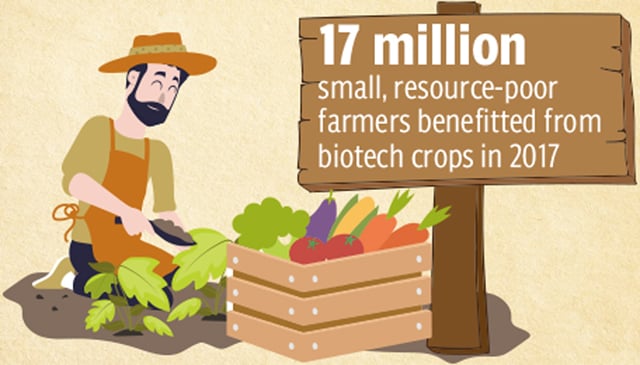
“As a general rule and adopting a precautionary approach, it is, however, clear that each individual case needs careful study and appraisal and the best possible containment measures before approval for uptake into commercial production is given,” he adds.
‘Corporate dominance’ fears
A farmer’s choice of seed is determined by his assessment of what is best for his farm, market demand and local growing environments. Proponents say, GE seed offers the ideal choice because it reduces the impact of agriculture on the environment, slashes costs via more targeted pesticide use, and minimises yield losses or crop damage from weeds, diseases and insects, as well as from extreme weather conditions, such as drought.
GMOs have helped to reduce pesticide application by 8.1% and increase crop yields by 22% over the past 20 years, according to scientific studies. Additionally, herbicide-tolerant GE crops enable farmers to reduce tillage, resulting in less loss of soil nutrients to dust from the farms and less use of fuels for the tractors and plows.
Apparently, farmers benefit the most from GE crops, but anti-GMO groups call it a ruse. They claim that since the genetic engineering technology is in the hands of a few multinational companies (MNCs), GE crops would lead to “corporate dominance” of agriculture.
Dr Khursheed shares these concerns. “GE technology is monopolised by MNCs; therefore, for every time sowing or rearing Pakistan will have to import GM seeds. This will deprive poor rural communities of their livelihood sources,” he fears.
Dr Malik believes “corporate dominance” is already there as far as consumer goods are concerned, but in the case of biotechnology, there is a “silver lining” to it. “The entire hybrid maize and hybrid vegetable seed is supplied by MNCs… Over the last 20 years there has been a massive investment in creating infrastructure and expertise for biotechnology,” he says. “Now there are several private sector agri-biotech companies which are marketing GM crops in collaboration with public sector universities and R&D institutions.”
Asim agrees with Dr Malik. “These companies [MNCs] invest heavily in research and farmer education programs. Therefore, it is not a coincidence that maize was the only crop that showed positive growth these past years,” he says.
Conversely, the MNCs have minimal presence in the seed market for other major crops of Pakistan, such as cotton, wheat and rice. “That is why these crops face a major challenge in terms of quality seed provision due to a lack of investment in research,” he adds.
Dr MacKenzie blames stringent regulations for this “so-called corporate dominance”.
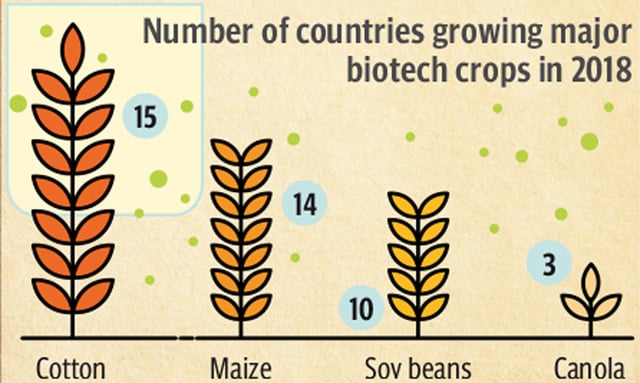
Should Pakistan go down the GMO route?
Present-day agriculture in Pakistan has been able to meet the food security requirements due to the ‘Green Revolution’ of the late 60s. Now we are at the threshold of a ‘Gene Revolution’ which is based on GM crops using various techniques of biotechnology. GM or transgenic crops are an extension of conventional plant breeding techniques.
“With our ability to sequence the whole genome of economic crops we are able to devise strategies for increasing crop yield, for improving nutrition, for developing resistance against pathogens and pests,” says Dr Malik.
But why take risks — even if perceived — when yields could easily be increased by other safe methods, asks Dr Khursheed. “Compared to the GE crops, other methods of breeding are safer, better, and protect the intellectual property right of our national crops.”
Dr Ishfaq believes Pakistani farmers can increase yields without going the GMOs route. “We should strengthen our agriculture R&D, focus on native germplasm, work on hybrid, and introduce precision-farming. This could definitely increase the yields of various crops by 15 to 20%,” he says.
Dr MacKenzie agrees that hybrid seeds, precision farming, “digital agriculture”, improved agronomic practices, fertilisers, and other inputs can all make significant and important contributions to increasing productivity. But he adds that significant improvements in “harvestable yield has been accomplished by using GE crops to better manage weeds, pests, and diseases that would otherwise have resulted in significant yield losses.”
Asim says no one claims the GE technology is a silver bullet and remedy to all challenges in agriculture. However, he says that farmers will have to take an integrated approach in employing all available agri technologies if they want to enhance productivity using minimal resources. “Over 95% of maize crop area in Punjab is already on hybrid seeds and will not experience exponential gains in yields unless a new innovation such as GE traits are introduced,” he adds.
Pakistan should go for GM crops in cases where conventional breeding is not possible. And Dr Malik says all the commercialised GM crops fall in this category.
The writer is the Editor of The Express Tribune
Published in The Express Tribune, December 2nd, 2019.
Like Business on Facebook, follow @TribuneBiz on Twitter to stay informed and join in the conversation.



















COMMENTS
Comments are moderated and generally will be posted if they are on-topic and not abusive.
For more information, please see our Comments FAQ